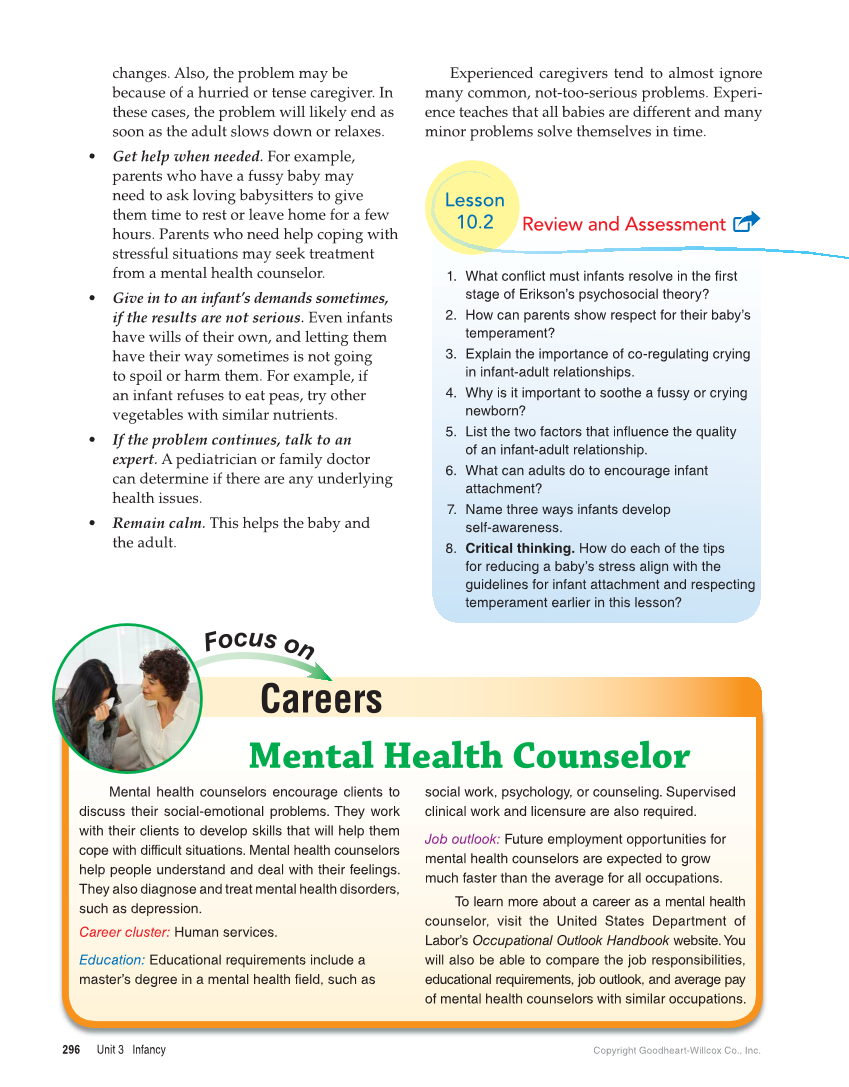296 Unit 3 Infancy Copyright Goodheart-Willcox Co., Inc. Experienced caregivers tend to almost ignore many common, not-too-serious problems. Experi- ence teaches that all babies are different and many minor problems solve themselves in time. Lesson 10.2 Review and Assessment 1. What conflict must infants resolve in the first stage of Erikson’s psychosocial theory? 2. How can parents show respect for their baby’s temperament? 3. Explain the importance of co-regulating crying in infant-adult relationships. 4. Why is it important to soothe a fussy or crying newborn? 5. List the two factors that influence the quality of an infant-adult relationship. 6. What can adults do to encourage infant attachment? 7. Name three ways infants develop self-awareness. 8. Critical thinking. How do each of the tips for reducing a baby’s stress align with the guidelines for infant attachment and respecting temperament earlier in this lesson? changes. Also, the problem may be because of a hurried or tense caregiver. In these cases, the problem will likely end as soon as the adult slows down or relaxes. • Get help when needed. For example, parents who have a fussy baby may need to ask loving babysitters to give them time to rest or leave home for a few hours. Parents who need help coping with stressful situations may seek treatment from a mental health counselor. • Give in to an infant’s demands sometimes, if the results are not serious. Even infants have wills of their own, and letting them have their way sometimes is not going to spoil or harm them. For example, if an infant refuses to eat peas, try other vegetables with similar nutrients. • If the problem continues, talk to an expert. A pediatrician or family doctor can determine if there are any underlying health issues. • Remain calm. This helps the baby and the adult. Mental Health Counselor Mental health counselors encourage clients to discuss their social-emotional problems. They work with their clients to develop skills that will help them cope with difficult situations. Mental health counselors help people understand and deal with their feelings. They also diagnose and treat mental health disorders, such as depression. Career cluster: Human services. Education: Educational requirements include a master’s degree in a mental health field, such as social work, psychology, or counseling. Supervised clinical work and licensure are also required. Job outlook: Future employment opportunities for mental health counselors are expected to grow much faster than the average for all occupations. To learn more about a career as a mental health counselor, visit the United States Department of Labor’s Occupational Outlook Handbook website. You will also be able to compare the job responsibilities, educational requirements, job outlook, and average pay of mental health counselors with similar occupations. Careers
